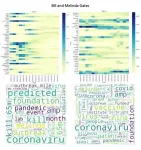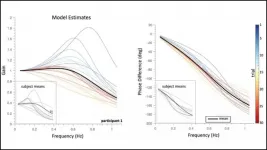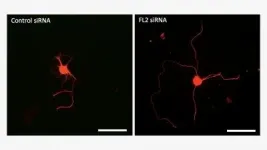(Press-News.org) Scientists at VCU Massey Cancer Center have identified a protein that operates in tandem with a specific genetic mutation to spur lung cancer growth and could serve as a therapeutic target to treat the disease.
Mutations in the p53 gene are found in more than half of all cancers, but it remains difficult to effectively target the gene with drugs even decades after its discovery. Though previous research has shown that p53 acts as a tumor suppressor and initiates cancer cell death in its natural state, a new study led by Sumitra Deb, Ph.D., suggests that gain-of-function (GOF) mutations -- a type of mutation where the changed gene has an added function -- turn p53 into an oncogene, causing cells to replicate uncontrollably and contribute to cancer development.
Recently published in Nature Communications, the researchers determined that mutant p53 genes are empowered by a specific protein, PLK3, to copy their genetic code and promote tumor cell proliferation through a process called transactivation.
Using preclinical models of lung cancer driven by p53 GOF mutations, Deb and his research team discovered that PLK3 activates an amino acid called serine 20 (S20), a cellular building block they found to play an important role in cancer cell replication.
By inhibiting PLK3 in GOF p53 mutant cells, they observed a decrease in the function of S20 along with overall reductions in transactivation and tumor cell formation.
"Our research indicates that GOF p53 exploits PLK3 to trigger its transactivation capability and exert oncogenic functions, raising the possibility of targeting p53-driven cancer cells using PLK3 inhibitors," said Deb, a member of the Cancer Biology research program at Massey and professor in the Department of Biochemistry and Molecular Biology at the VCU School of Medicine.
Deb's team will continue to explore the potential for PLK3 inhibitors to be effective drugs in the treatment of lung cancer and potentially other forms of disease with the same genetic mutation.
INFORMATION:
Sumitra Deb collaborated on this research with Brad Windle, Ph.D., Jolene Windle, Ph.D., Raghavendra Pillappa, M.D., and Swati Deb, M.S., Ph.D., members of the Cancer Biology research program at VCU Massey Cancer Center; Catherine Vaughan, Ph.D., Shilpa Singh and Mark Subler, Ph.D., of the VCU School of Medicine; Steven Grossman, M.D., Ph.D., physician-in-chief at USC Norris Comprehensive Cancer Center and former deputy director at Massey; Andrew Yeudall, Ph.D., of Georgia Cancer Center at Augusta University; and Elizabeth Fry and Kazushi Inoue, M.D., Ph.D., of the Wake Forest University School of Medicine.
LOS ALAMOS, N.M., April 19, 2021--A new machine-learning program accurately identifies COVID-19-related conspiracy theories on social media and models how they evolved over time--a tool that could someday help public health officials combat misinformation online.
"A lot of machine-learning studies related to misinformation on social media focus on identifying different kinds of conspiracy theories," said Courtney Shelley, a postdoctoral researcher in the Information Systems and Modeling Group at Los Alamos National Laboratory and co-author of the study that was published last week in the Journal of ...
PHILADELPHIA-- A retrospective study led by researchers from Penn Medicine found that with MitraClip for treatment of secondary mitral regurgitation (MR), a heart disease associated with problems in the left ventricle, there was no negative effect of having a slightly smaller mitral valve opening as long as there was good reduction of the mitral regurgitation. The study is published today in JACC: Cardiovascular Interventions.
"This data is very reassuring for physicians who place MitraClips in patients with secondary mitral regurgitation. It demonstrates that the benefits of MR reduction in patients with heart failure were maintained even when mild-to-moderate mitral stenosis, which can be caused by a narrowing of the ...
While cardiovascular disease (CVD) remains the leading cause of death globally, new research led by NYU Grossman School of Medicine and Moi University School of Medicine (Kenya) found that addressing and incorporating social determinants of health (such as poverty and social isolation) in the clinical management of blood pressure in Kenya can improve outcomes for patients with diabetes or hypertension.
The study -- recently published online in The Journal of the American College of Cardiology - found that after one year, patients who received a multi-component intervention that combined community microfinance groups with group medical visits (where patients with similar medical conditions met together with a clinician and community health worker) ...
A first-of-its-kind study led by The University of Texas at Austin has found that rock weathering and water storage appear to follow a similar pattern across undulating landscapes where hills rise and fall for miles.
The findings are important because they suggest that these patterns could improve predictions of wildfire and landslide risk and how droughts will affect the landscape, since weathering and water storage influence how water and nutrients flow throughout landscapes.
"There's a lot of momentum to do this work right now," said study co-author Daniella Rempe, an assistant professor at the UT Jackson School of Geosciences Department of Geological Sciences. "This kind of data, across large scales, is what is needed to inform next-generation models of land-surface processes."
The ...
The fact that the human body is made up of cells is a basic, well-understood concept. Yet amazingly, scientists are still trying to determine the various types of cells that make up our organs and contribute to our health.
A relatively recent technique called single-cell sequencing is enabling researchers to recognize and categorize cell types by characteristics such as which genes they express. But this type of research generates enormous amounts of data, with datasets of hundreds of thousands to millions of cells.
A new algorithm developed by Joshua Welch, Ph.D., of the Department of Computational Medicine and Bioinformatics, Ph.D. candidate Chao Gao and their team uses online learning, greatly speeding up this process and providing a way for researchers ...
A lot about the human brain and its intricacies continue to remain a mystery. With the advancement of neurobiology, the pathogenesis of several neurodegenerative diseases (ND) has been uncovered to a certain extent along with molecular targets around which current therapies revolve. However, while the current treatments offer temporary symptomatic relief and slow down the course of the disease, they do not completely cure the condition and are often accompanied by a myriad of side effects that can impair normal daily functions of the patient.
Light stimulation has been proposed as a promising therapeutic alternative for treating various ND like ...
The brain's auditory system tracks the speed and location of moving sounds in the same way the visual system tracks moving objects. The study recently published in eNeuro lays the groundwork for more detailed research on how humans hear in dynamic environments.
People who use hearing aids have trouble discriminating sounds in busy environments. Understanding if and how the auditory system tracks moving sounds is vital to improving hearing aid technology. Prior research utilizing eye movements to gauge whether the brain is following the trajectory of a moving sound indicates it cannot. A new study from García-Uceda Calvo et al. instead used head movements, a more accurate measure of sound tracking.
The team analyzed head movements of hearing ...
April 19, 2021--(BRONX, NY)--Researchers at Albert Einstein College of Medicine have developed a topical drug that regenerates and restores the function of erectile nerves damaged by radical prostatectomy, the most common treatment for localized prostate cancer. The drug was tested in rats, and the findings were published online today in JCI Insight.
"Erectile dysfunction (ED) after radical prostatectomy has a major impact on the lives of many patients and their partners," said study co-leader David J. Sharp, Ph.D., professor of physiology & biophysics and of ophthalmology and visual sciences and professor in the Dominick P. Purpura Department of Neuroscience at Einstein. "Since rats are reliable animal models in urologic research, our drug offers real hope of normal sexual ...
DALLAS - April 19, 2021 - Treating people with Type 2 diabetes with a new once-a-week injectable insulin therapy proved to be safe and as effective as daily insulin injections, according to the results of two international clinical trials published online today in Diabetes Care. The studies suggest that the once-weekly treatment could provide a convenient alternative to the burden of daily insulin shots for diabetes patients.
Starting and maintaining insulin treatment remain a challenge for millions of patients worldwide with Type 2 diabetes. Fear of injections and the inconvenience and burden of injectable therapy contribute to the barriers against insulin therapy initiation and adherence. The effectiveness and safety of ongoing insulin treatment are also highly dependent ...
Data from a GPS network in Colombia have revealed a shallow and fully locked part on the Caribbean subduction zone in the country that suggests a possible large earthquake and tsunami risk for the northwest region.
The locked patch south of Cartagena city is capable of generating a magnitude 8.0 earthquake every 600 years, said Sindy Lizarazo of Nagoya University in Japan, who presented the study at the Seismological Society of America (SSA)'s 2021 Annual Meeting.
Colombia lies in the middle of a complex tectonic zone, where the Caribbean, Nazca and South American tectonic plates and other smaller tectonic blocks converge. The Caribbean plate ...





